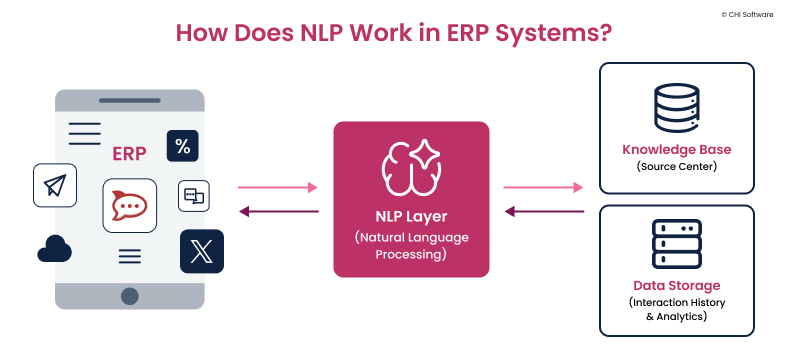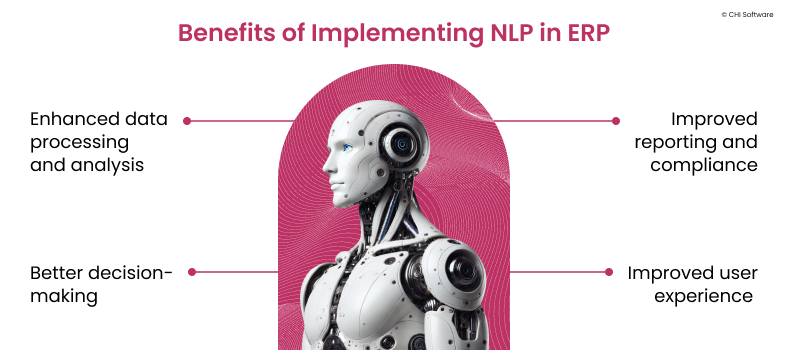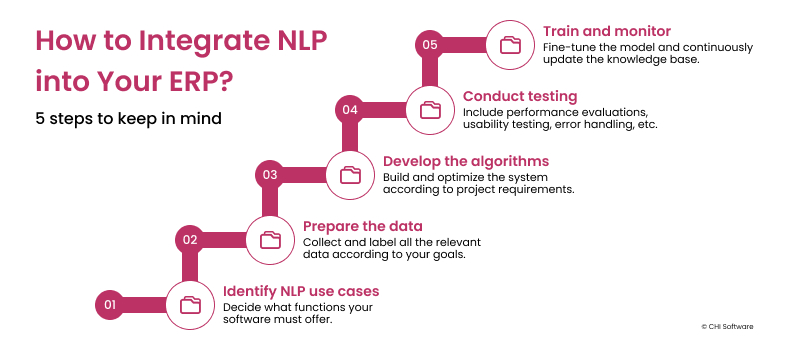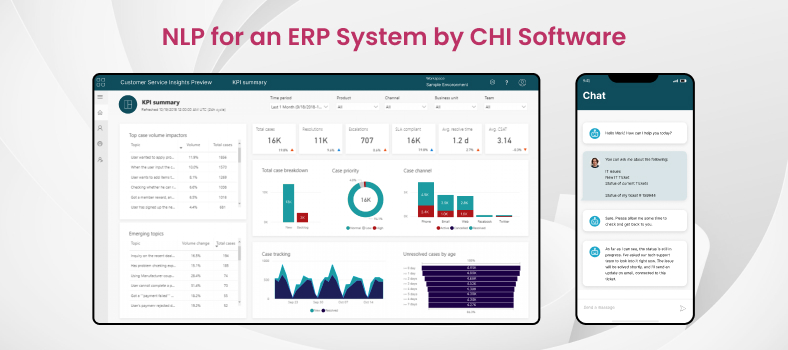Businesses in many different industries use Enterprise Resource Planning (ERP) to facilitate their workflows. The use of ERP has many advantages, and the experience of prominent companies like Nestlé and Coca-Cola confirms this. This active use of ERP and the ever-growing demand for it are driving the need for ERP automation with the help of Artificial Intelligence, specifically Natural Language Processing (NLP).
Our case study, which will be discussed in detail, found that AI-driven ERP solutions are highly efficient, improve data accessibility and analysis, and also enable businesses to predict trends and make proactive decisions. Companies that have already enhanced their ERP systems with AI report faster response times, improved task accuracy, and a significant reduction in manual work. That’s why, in this article, we’ll look at how NLP integration is revolutionizing ERP systems and use our case study to showcase a real-world application of NLP in ERP and its results.
NLP in ERP: How Does It Work?
The best way to think of NLP is as a translator from human language to a specific computer programming language, but it also offers the benefits of AI in business automation. For example, it offers real-time data access, which means NLP can be used to process information, search for relevant data points, and run or predict queries. Automating these actions, which usually require several employees, leads to process automation of the whole ERP system.Therefore, we can understand the general elements of how NLP improves ERP systems at this stage.

The basic scheme representing the work of NLP algorithms
In addition, NLP can improve the user experience for non-technical staff interacting with complex ERP systems by entering commands using natural language instead of code, thus reducing lengthy training processes. Once NLP is implemented, the software can understand and respond to input data in human language. This process has the following steps:
- Data input. At this stage, users interact with the ERP. They can use text commands or enter voice queries.
- Language processing. NLP breaks down the sentence structure, identifies critical terms, as well as the context and purpose of the query. It uses machine learning algorithms and models to understand the meaning and context of words.
- Finding information and generating a response. Next, based on the information received and interpreted by NLP, the system searches for relevant data in its database and generates a response. This can be a report, a specific piece of data, or an action within the ERP system. This response, once processed by NLP, will be designed to be presented to the user in a natural, understandable way.
A Step-By-Step Guide to Implementing Your First Chatbot
Read more
Another characteristic of NLP in ERP is continuous learning. NLP systems often include machine learning components that allow them to improve over time. This is an incredible advantage, because the more users interact with it, the better the system understands language patterns, user preferences, and context. This continuous analysis and improvement leads to more accurate and effective responses. Implementing custom chatbot development can further enhance this capability, adapting the system precisely to your business needs.
The Main Benefits of Implementing NLP in ERP Systems
Since the importance of intelligent automation in ERP is already apparent today, let’s look at the specific benefits of NLP in ERP software.

The most common reasons why businesses implement NLP solutions in their ERP systems
Enhanced Data Processing and Analysis
NLP acts as a translator with many additional functions. Let’s start with an example of how it can simplify the employees’ workflows. NLP can save a significant amount of time when searching for data because it understands the context of a query, not just a set of keywords, and finds and displays the most relevant data.
Intelligent retrieval also recognizes abbreviations or synonyms. As an illustration, to get the most recent changes in reports, you don’t need to enter the document’s date or name; you need to request “most recent sales report”, and NLP will be able to prioritize the latest documents by understanding the purpose of the request.
Another cutting-edge feature is information access in ERP. The NLP can combine information from different system modules in its responses. Therefore, the information provided will be more accurate.
Custom Chatbot Development vs. Ready-Made Assistants: Pros and Cons for Businesses
Read more
Improved Reporting and Compliance
NLP is a master of data analytics. First of all, its intelligent tools can analyze and classify documents. Engineers can also program NLP software to check documents according to specific standards. ERP response time reduction is also the result of skilful handling of all existing data in the system.
Second of all, detailed risk analysis is possible, since NLP inspects all textual information for unusual patterns, ensuring consistency between documents and also preventing errors that can be made during manual work.
NLP implementation enables business process optimization at any level of complexity. NLP can enable ERP systems to generate reports of various types, from general reports to specific requests from your employees, sorting information based on any data query.
Do you want your business to make a difference with the help of NLP? We can help you make it real.
Just leave us a message
Better Decision-Making
AI-powered ERP also predicts trends in your customers’ requests, even those that are not readily apparent. These processes help your ERP system create different scenarios for your business development in the future so that the company can consider several strategies before making a decision based on enhanced business intelligence.
After conducting a detailed customer feedback study, NLP can help you understand the overall picture of consumer sentiment, enablings your team to improve the quality of customer service and focus more on customer needs. By the same token, you can also use it to keep an eye on employees’ sentiment and better understand their everyday concerns. These benefits make it clear that NLP applications in enterprise resource planning can play a crucial role.
Knowledge Base Chatbots: Build, Evolve & Optimize AI Support
Read more
Improved User Interface and Experience
Automating ERP processes with NLP is not limited to only these use cases. To start with, we are now able to communicate through chatbot interfaces using everyday language and without the need for pre-programmed commands, which has already radically changed the user experience in ERP systems.
Chatbots have evolved to become virtual assistants: AI-powered agents that can answer questions and go through all the stages of, for example, an online purchase. Nowadays, voice commands are becoming more widely used, for a couple of reasons:
- it is often more faster and convenient for users to pronounce a word than write it;
- voice commands make ERP services more accessible to people with disabilities, such as those with visual impairments or limited mobility.
An ERP system powered by NLP is able to study and provide up-to-date information, predict the development of a particular area of your business, analyze the needs of customers and employees, and make communication easier. So, how do you start integrating NLP? Let’s break down the steps.
How to Integrate NLP into Your ERP? 5 Steps to Keep in Mind
Implementing changes to any system can be a long and confusing process – but following these precise steps will lead you to excellent results.

These are the fundamental steps of NLP implementation common for businesses of any size.
Step 1: Identify the Use Cases for NLP in Your ERP
Like any other task, implementing NLP into a system requires some preparation. Decide precisely what part of your workflow you are looking to improve. Perhaps, you see more promise in using chatbots or monitoring customer feedback, or you need to improve your reporting and reduce response times in ERP systems using NLP.
You may only need to prioritize targeted areas for automating ERP processes with NLP. As you identify areas for integrating NLP, you may need to use multiple programming languages or frameworks, so you need to start with a solid foundation by being specific about what you want to accomplish.
AI at Your Service: How Chatbots Are Shaping the Future of Workplace Productivity
Read more
Step 2: Prepare the Data
Data preparation is critical because the accuracy and reliability of the NLP’s work depend on the quality of the data entered.
First, the information has to be cleaned and formatted: different formats collected from various sources have to be processed to fit a single, straightforward form for the system to use.
Then, with the help of machine learning, smart ERP systems will be able to learn from data and summarize previously unseen information, thus being able to perform tasks without explicit instructions.
Step 3: Develop the Algorithms
Once you’ve set your priorities and cleaned your data, you will move on to the next stage of digital transformation in ERP – implementing changes to the system. This means developing and configuring natural language processing algorithms to meet your requirements.
It also means optimizing the system to efficiently process workflows specific to your business.
Step 4: Conduct Testing
It is essential to conduct testing to ensure that processes run seamlessly and that natural language understanding in ERP is trouble-free. This helps to minimize disruptions and maximize productivity.
During the testing process, the NLP model is subjected to a series of rigorous evaluations designed to ensure its performance, usability, error handling and edge cases, security and compliance checks, and other key factors. Also, during the testing phase, AI chatbot security must be a key focus, ensuring that the NLP-powered system can protect against data breaches, unauthorized access, and other security threats.
Step 5: Train and Monitor the NLP Solution
A unique aspect of using NLP is that after initial implementation, the focus will shift to training the model to learn patterns, nuances and contextual clues in natural language. The training process involves fine-tuning the model to improve its accuracy and relevance to your business’ particular use cases.
Once trained, maintaining performance becomes crucial. Users should be given tips on how to interact effectively with the NLP system. This stage also includes troubleshooting problems or answering any questions from employees. Ongoing support must be provided to ensure that users become confident in using the new technology.
Beyond Conversations: Exploring ChatGPT Capabilities in Business
Read more
Due to the constant flow of new data, the system may need to be updated occasionally. It’s important to ensure that algorithms and data are updated and new features are implemented promptly. You may also wish to use collected user feedback to make improvements.
After successfully passing through these stages, your company can enjoy the foundation for increased productivity, precision in management, and improved decision-making with the support of enterprise AI solutions.
A Look into CHI Software’s NLP Innovations
To demonstrate the revolutionary impact of advanced ERP features, we offer our work for consideration.
This case study looks at one of our Canadian clients, who had a working ERP system but wanted to improve data access efficiency and increase customer satisfaction by implementing artificial intelligence and cloud ERP solutions.
The project’s goal was to develop an AI assistant for the ePayment system to reduce customers’ waiting time for answers, and make information more accessible.
CHI’s Solution
Based on the client’s goals, our team decided that a chatbot was the best solution. First, the developers implemented NLP methods, allowing the chatbot to receive information from sources of different formats, including articles and videos from the client’s website. In addition, the team developed a user-friendly admin panel and implemented machine learning algorithms so that the chatbot could continuously learn and improve.

Desktop and mobile versions of the NLP-driven ERP system
After three months of working on the idea, our AI-driven solution delivered:
- Improved user experience. An AI chatbot in an ERP system boosted the user experience by simplifying navigation and interaction with the platform, with a predicted customer satisfaction increase of 15%.
- Improved operational efficiency. The introduction of NLP and seamless cloud integration significantly revamped the company’s operational structure. The most significant benefit is a 20% reduction in response time. Moreover, the chatbot reduced the need for manual intervention by 30%.
- Cost savings and scalability. The transition to cloud hosting optimized costs by 30%.. This improvement guaranteed the economic efficiency of the company and its improved adaptation in the market among competitors. After deploying to Azure Cloud infrastructure, the company saw significant cost savings, scalability, and flexibility.
- Competitive advantage. NLP in ERP systems has another practical function that should have been mentioned earlier. In our case, the NLP innovation gave the business a competitive advantage, which positioned the company as a leader in the industry and strengthened customer loyalty.
What goals and metrics do you want to reach with NLP innovations? Let's discuss where and how you can start.
Contact the CHI team
Conclusion
Enterprise software integration equips companies with advanced capabilities across various fields. It can not only enhance operational efficiency but also drives innovation and competitive advantage. That’s why the merger of NLP and ERP systems will be crucial to maintaining competitiveness. With the introduction of such technologies, companies can unlock the full potential of their business.
By explaining how NLP functions in ERP systems, we hope we’ve made it easier to understand the significant benefits that NLP offers. For businesses aiming to enhance their ERP systems with NLP, exploring NLP consulting services can be a valuable first step, providing expert guidance and tailored strategies for success. You can see the results for work done and showed honest results for full confirmation. So, if you’re ready to improve your team’s performance by implementing AI, share your ideas with us.
FAQs
-
How can NLP enhance the efficiency of our existing ERP system?

Digital transformation in ERP requires the mandatory use of NLP. This innovation will surely improve the quality of your team's work and increase user satisfaction. NLP has many benefits, such as personalizing each user's experience based on their preferences, improving communication, and offering predictive analytics for management.
-
Can CHI Software provide a demo or case studies of previous NLP implementations?

We can tell you briefly about some of our cases. Our expertise includes a multilingual chatbot built for a global e-commerce platform. The bot helps the platform understand customer queries and answer them in multiple languages.
CHI Software also developed NLP for medical data management. The new system can see and understand patient treatment plans and results. This simplification allows healthcare professionals to spend less time analyzing unstructured data and, as a result, spend time making vital decisions. This is only a small part of our developments, so we invite you to check our case studies on the website.
-
What makes CHI Software's NLP development services stand out?

First of all, our company is experienced. Since 2006, we have been implementing various IT projects, and generative AI and NLP are our key specializations. We have already completed a lot of high-quality work in this area, confirming our reliability.
In addition to AI specialists, our team includes front-end, back-end, testing, UI/UX design, and cloud engineering specialists. So we can offer a reliable solution to improve your business.
Our team of professionals also provides comprehensive support from project concept development to product integration.
-
How does CHI Software handle data privacy and security in NLP projects?

To ensure the security of all your data, our experts use the following methods:
1. Secure Data Storage and Transfer
Data is encrypted not only during transmission but also at rest. For this purpose, robust encryption protocols are used. In addition, only authorized personnel can access sensitive data through strict access control.
2. Secure Development Practices
Secure practices include implementing input validation, securing APIs, and performing regular code reviews. In addition, we conduct regular penetration tests and security audits. These actions allow our specialists to identify and eliminate possible vulnerabilities promptly.
3. Data Processing
CHI Software uses only secure cloud solutions that comply with industry standards such as ISO/IEC 27001.
4. Data Anonymization
CHI Software ensures that any personally identifiable information (PII) in datasets is anonymised before processing. We accomplish this by using methods such as removing, hiding or encrypting sensitive data to prevent individuals from being identified.
5. Compliance with Data Protection Regulations
CHI Software complies with the General Data Protection Regulation (GDPR) and other relevant data protection laws, ensuring that all projects, without exception, comply with legal requirements for processing personal data. The company also enters into DPAs with clients to clarify our data protection responsibilities and ensure compliance with the regulations.
-
How much time and budget do I need to build an NLP solution with CHI Software?

The time and budget for building an NLP solution can vary depending on the complexity and size of the project, data quality, and the resources available. We can provide information on the estimated price of your future project.
For example, implementing a simple chatbot using the OpenAI API with minimal customisation will cost USD 2,000. It would take several weeks to create such a product.
If you need a more complex solution with a higher level of customisation, we can develop it for approximately USD 20,000. More complex, larger projects will cost more - up to USD 100,000 and will take longer to complete.
In our case study, where we created 15 new features and met nine business requirements for an ERP system using NLP, the development time took three months.
About the author
Olha boasts a decade-long journey in NLP, currently serving as a researcher at Jena University and a Consulting ML/NLP Engineer at CHI Software. Her expertise extends to various realms of NLP, including text summarization, named entity recognition, and keyword extraction. Olha's Ph.D. thesis explored knowledge representations and information retrieval in librarian systems.
Rate this article
24 ratings, average: 4.5 out of 5






